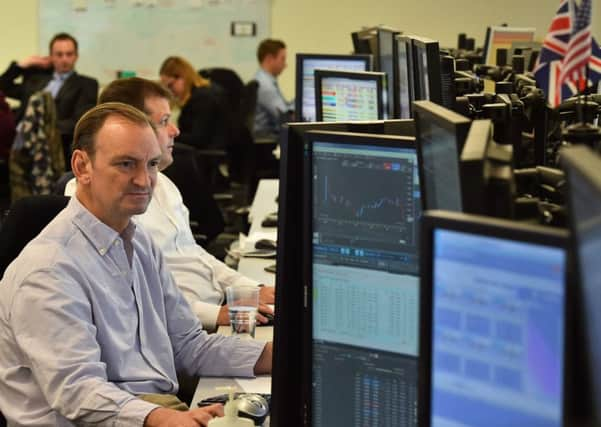Bill Jamieson: When will UK plc awake from this nightmare?


What a spectacular backfiring. It has left the UK’s position on Brexit totally muddled and confused. A barely workable government majority cannot but weaken Britain’s hand in Brexit negotiations and may delay the start of talks.
And for sterling, inflation and interest rates, uncertainty now abounds – and with it, the prospect of unnerving volatility until another general election as early as this autumn.
Advertisement
Hide AdAdvertisement
Hide AdAnother election so soon? It is a prospect that elicits an overwhelming, nationwide groan.
The one baleful consolation for business is that, even assuming an administration can be formed to take charge on a “confidence and supply” basis, there is little by way of significant change in tax and spending that could make its way through parliament.
The avoidance of nationalisation risk and a reversal of recent falls in Corporation Tax are positives for business. It also means that the Bank of England will be more likely to keep interest rates at their ultra-low level of 0.25 per cent for now given the fragile state of business and household confidence.
And many Europe-focused businesses will now be hoping that a hard Brexit can be avoided and that some means can be found of keeping the UK in an EFTA-style relationship with the EU.
Meanwhile, almost everything is in gridlock – and with even less clarity on Brexit and our relations with the EU. The big picture reality is this: the economy, both across the UK and Scotland, is slowing. Real incomes are falling. The fall in sterling following the election result will put further upward pressure on prices for imported goods and services – and higher prices in the shops.
In Scotland, growth is trailing that of the UK, and while outright recession should be avoided, the continuing weakness in the oil price suggests little by way of a recovery in oil-related investment and onshore oil-related engineering and supply.
As for sterling, its renewed weakness on Friday helped shares in leading companies to rise, with the FTSE100 Index sporting initial gains. But this index is largely comprised of global corporates which earn most of their revenues outwith the UK. A lower pound works to boost overseas earnings on currency translation. By contrast, the FTSE250 index, largely comprising UK-facing companies, suffered immediate falls on concerns over higher commodity and raw material costs – and even more prolonged uncertainty over trade with the EU.
Even before the election the consensus view was that the UK economy would grow more slowly after Brexit, notwithstanding its better than expected performance in the immediate aftermath.
Advertisement
Hide AdAdvertisement
Hide AdIn its latest assessment issued just before the election, the Organisation for Economic Co-operation and Development warned that rising inflation and weak wage growth will leave Britain rooted to the bottom of the league table for living standards among the West’s richest countries next year.
The Paris-based thinktank said the next government would spend the first 18 months of the next parliamentary term presiding over a severe squeeze on real incomes.
It said inflation at 2.7 per cent during 2018 would dwarf wage growth of 1.5 per cent and result in the UK having the weakest real income performance, alongside Finland, of any of its 34 rich member states.
The OECD made no changes to previous predictions that the UK will suffer a Brexit-related slowdown, with growth easing from 1.8 per cent in 2016 to 1.6 per cent this year and just one per cent in 2018.
The TUC general secretary, Frances O’Grady, said that boosting wages would have to be a top priority for whoever gets the keys to Downing Street. “British workers still haven’t recovered from the last financial crisis. The last thing they can afford is another hit on their finances.”
But public sector spending is likely to be kept under strict rein. The UK budget deficit increased by £1.2 billion to £10.4 billion in April compared with April 2016, the highest April borrowing since 2014.
And public sector net debt (excluding public sector banks) was £1,722.4 billion at the end of April, equivalent to 86.0 per cent of gross domestic product (GDP), up by £114.1 billion (or 2.5 percentage points as a ratio of GDP) on April 2016. This will continue to act as a major constraint, whatever the complexion of the new UK administration.
The OECD’s assessment is that the budget deficit is projected to remain broadly unchanged this year, but fiscal consolidation is planned for 2018 despite a weaker growth outlook. It would like to see further fiscal initiatives to increase public investment “to support demand in the near term and boost supply in the longer term”.
Advertisement
Hide AdAdvertisement
Hide AdBut they may have to await another budget. That in turn requires a government with a mandate. And that requires yet another general election.
Finally, in the wake of the hung election result the Scottish Chambers of Commerce has urged the UK and Scottish governments to get back to business, placing the economy, skills and exporting at the heart of the national agenda for the next five years. Its priorities include a deal on the rights of EU nationals to live and work in the UK; a migration policy which meets the skills needs of our business sectors, a clear industrial strategy fully aligned across the UK and a commitment to no new up-front business taxes for the duration of the parliament.
Amen to all that. Similar lofty sentiments were expressed by the CBI. But such is the political gridlock, there is little immediate prospect of these wish lists being acted on. Indeed, the more likely prospect is that business expansion and investment will be put on hold until today’s thick black fog of uncertainty begins to lift. And that may take months.